
The Pandemic in Posters
Andrea von Hegel | 25 March 2021
In Germany, the Covid-19 pandemic first upended everyday life one year ago. The first lockdown in the Federal Republic started in March 2020, and today politicians are still searching for ways out of the second one. The restrictions imposed to fight the pandemic have left their mark on society. In this series, five head curators at the Deutsches Historisches Museum reveal how the coronavirus pandemic has been documented in the collection. Andrea von Hegel, head of the Poster Collection, looks back at posters that were displayed in the public sphere and considers how they document the extensive adjustments that people had to make to their behaviour and interactions with others every day.
Like elsewhere, the number of new cases of Covid-19 and related deaths increased dramatically in Germany in March 2020. Hospitals struggled to cope with the pandemic situation created by this novel coronavirus. On 22 March 2020, the German government decided to impose a far-reaching ban on social contact, which brought public life to a near standstill.
Only a few days later, the first posters featuring witty slogans and puns started appearing in public spaces. They told a society not used to pandemics that in order to protect everybody from the virus it was necessary to restrict contacts and comply with new rules of behaviour – social distancing, hygiene, face masks. These posters were commissioned by businesses which responded to this entirely unprecedented situation and – in their own interest – used media campaigns as a means of social engagement in the fight against the seemingly abstract coronavirus. During the spring of 2020, the effects of the ban on social contacts and social gatherings were illustrated by posters from charities, local authorities, event organisers, and others.
If we look back at some of the posters from this first phase of the Covid contact ban which have been gifted to the Deutsches Historisches Museum and try to draw first conclusions, we are reminded of the profound shifts in human behaviour and interaction that were required of the populace to tackle the coronavirus crisis. These posters reflect the challenges that had to be navigated in the pandemic, the economic, social, and personal problems caused or intensified by the isolation that people experienced during the contact ban.
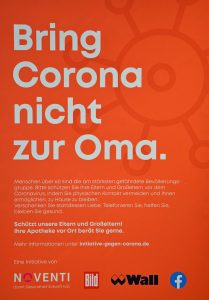
Bring Corona nicht zur Oma, Plakate einer von der apothekereigenen Unternehmensgruppe NOVENTI in Kooperation mit WALDecaux, BILD und Facebook gestarteten „Initiative gegen Corona“, Entwurf: Avantgarde. Gesellschaft für Kommunikation mbH, München, Datierung: März 2020, Copyright: NOVENTI , P 2020/176 © Foto: DHM
‘Don’t take Covid to your granny’ was one of the first slogans of the ‘Initiative against Covid’ launched by the healthcare holding company NOVENTI. A society based on close physical interaction had to learn that the measures imposed on the population were urgent and necessary. Slogans were spliced over the graphic outline of a virus particle and bore such statements as: ‘Stay at home. Send out love’; ‘Stick together. Keep your distance’; ‘This ad can save lives’; or ‘Don’t sow the virus. Sew your mask’. The statements urged people to keep to social distancing and hygiene rules, wear a face covering, and show consideration for older people and other vulnerable and high-risk groups. They promoted social closeness despite spatial and physical distance. The exhorting, optimistic tone of this poster series sought to encourage people and reassure them that sacrifices and Covid-appropriate behaviour would finally guarantee success in the battle against the virus.
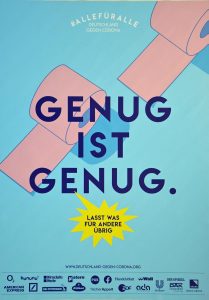
Genug ist genug. Lasst was für andere übrig. Plakate einer von der Agenturgruppe fischerAppelt AG in Kooperation mit Partnern aus der Wirtschaft gegründeten Initiative „Alle für Alle – Deutschland gegen Corona“. Entwurf: Philipp & Keuntje, Hamburg, Datierung: März 2020, Copyright: fischerAppelt AG, Hamburg; Philipp und Keuntje GmbH, Hamburg, P 2020/240 © Foto: DHM
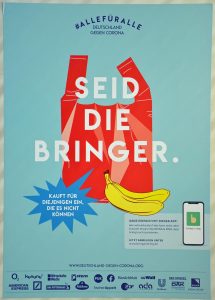
Seid die Bringer. Kauft für diejenigen ein, die es nicht können. Plakate einer von der Agenturgruppe fischerAppelt AG in Kooperation mit Partnern aus der Wirtschaft gegründeten Initiative „Alle für Alle – Deutschland gegen Corona“. Entwurf: Philipp & Keuntje, Hamburg, Datierung: März 2020, Copyright: fischerAppelt AG, Hamburg; Philipp und Keuntje GmbH, Hamburg, P 2020/236 © Foto: DHM
The motifs of the solidarity campaign ‘All for All – Germany against Covid’ run by fischerAppelt conveyed similar messages, initially as moving digital displays in poster format, later in print form. The posters illustrated the behaviour recommended by virologists and politicians. The slogan ‘Enough is enough’ criticised the hoarding, especially of toilet paper, that had started just before the first lockdown. Riffing on the verb bringen (to bring – be useful, successful), the slogan ‘Seid die Bringer’ (Be the bringers), directed especially at younger people, calls upon them to offer help and assistance. It also suggests that solidarity can overcome the coronavirus crisis.
The German city of Jena was the first in the country to make face coverings mandatory. Designed like traffic signs, with texts and pictograms, these posters look like official decrees which establish mandatory rules for the local population. The campaign posters of ‘Coronavirus – We stand in Solidarity’ and the ‘Jena bundle strategy against Covid’ comprehensively illustrate the range of behavioural rules and restrictions. They also document the efforts of the local authorities to protect the population from Covid and find a way out of crisis.
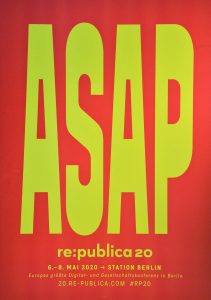
ASAP (As soon as possible). Plakat für die re:publica Berlin, Konferenz zu Internet und digitaler Gesellschaft (Netzpolitik, Digitalkultur und digitale Gesellschaft) vom 6. – 8. Mai 2020 in Berlin. Entwurf: Agentur fertig design, Datierung: 2020, Copyright: republica GmbH, P 2020/318 © Foto: DHM

Re:publica im digitalen Exil! Plakat für die am 7. Mai 2020 online stattfindende re:publica. Entwurf: Agentur fertig design, Datierung: 2020, Copyright: republica GmbH, P 2020/324 © Foto: DHM
The digital conference re:publica was scheduled to take place in Berlin from 6 to 8 May 2020 and the motto of that year’s event was ‘As soon as possible’ – ASAP. Since events as big as this, with thousands of visitors, were banned at that time, the organisers moved the whole conference online and facilitated discussions with the participants on its newly launched platform www.re.publica.tv. This change was indicated by the small eye-catching ‘Republica in digital exile’ poster and the large-format ASAP poster, printed in glowing colours.
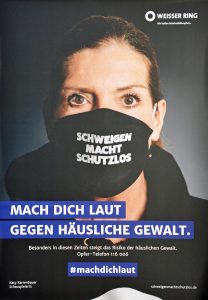
Schweigen macht schutzlos – Mach Dich laut gegen häusliche Gewalt. Besonders in Zeiten wie diese steigt das Risiko der häuslichen Gewalt. Plakat der Opferhilfe-Organisation WEISSER RING gegen zunehmende häusliche Gewalt als Folge der durch die Corona-Krise hervorgerufenen Isolation. Abgebildet: Katy Karrenbauer, Schauspielerin. Entwurf: dashomeoffice.com / SevenOne AdFactory; Creative Director: Friedrich-Paul Spielhagen & Daniel Koller, Fotograf: Viktor Strasse, Datierung: Mai 2020, Copyright: WEISSER RING e.V., P 2020/68 © Foto: DHM
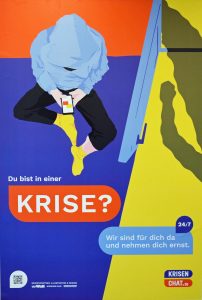
Du bist in einer Krise? Wir sind für Dich da und nehmen Dich ernst. Plakat für die Plattform Krisenchat.de. die vor allem jungen Menschen Hilfe anbietet. Illustration: Josephine Rais, Design: Studio Hollywood, Datierung: Mai 2020, Copyright: Krisenchat.de, P 2020/65 © Foto: DHM
Being confined at home for weeks on end – often in cramped conditions − unemployment, feeling anxious about one’s personal finances and the future, forced isolation, no social contact, increased aggression, depression, thoughts of suicide.
‘Silence makes you vulnerable, be loud’, a campaign launched by the WEISSER RING, addressed the increase in domestic violence that women experienced during the Covid-19 pandemic. Female celebrities made themselves available pro bono to raise awareness and encourage women facing such crises to seek help. The WEISSER RING, an organisation that has been supporting victims since 1976, wanted to protect vulnerable women not only from domestic violence but also from Covid. The masks were made by inmates of a correctional facility as part of a rehabilitation programme.
The Covid-19 crisis has had a particularly severe impact on young people, intensifying feelings of loneliness and social isolation, a lack of perspective, and even domestic violence and child abuse. The image of a young person wearing a hoody and holding a mobile phone, who is threatened by the shadow of an adult with clenched fist, illustrates the distress that many feel. Founded at the beginning of the pandemic by young people for children and youths under 25, the platform Krisenchat.de is currently offering free emergency psychosocial support. Young people seeking help can reach professional counsellors at Krisenchat.de, all volunteers, 24 hours a day, seven days a week. Demand for this crisis chat is worryingly high.